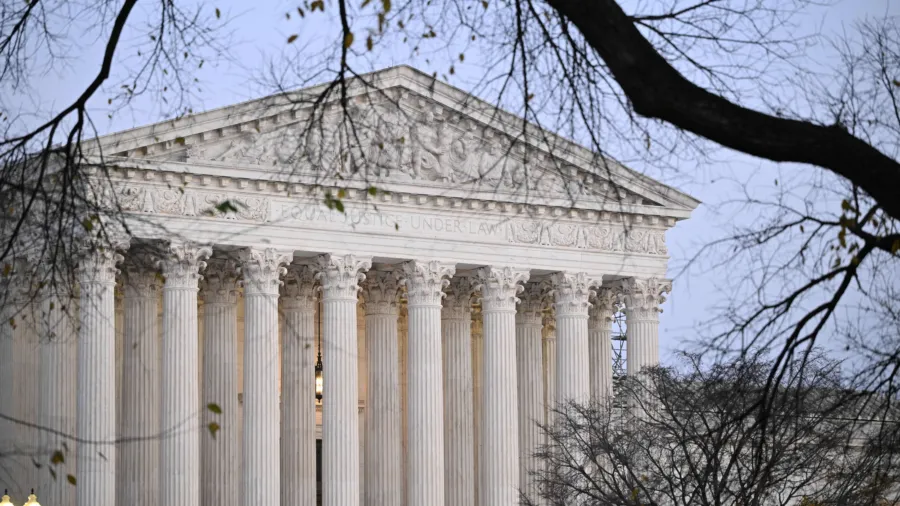The U.S. Supreme Court is set to hear oral argument on the constitutionality of administrative law courts within the Securities and Exchange Commission (SEC) on Nov. 29—teeing up yet another opportunity this term for justices to review bureaucrats’ power.
SEC v. Jarkesy involves a hedge fund manager, George Jarkesy, whom the agency penalized for violating securities fraud law.
More specifically, the SEC imposed a civil penalty of $300,000 on Mr. Jarkesy after bringing an administrative proceeding against him. The agency ultimately agreed with the administrative law judge’s conclusion that Mr. Jarkesy had violated securities law.
Mr. Jarkesy appealed his case and won in the U.S. Court of Appeals for the Fifth Circuit, which held that the SEC’s actions were unconstitutional in several ways.
First, it ruled that the administrative law court violated the Seventh Amendment to the U.S. Constitution by not providing a jury trial.
Second, it held that Congress had improperly delegated its own power to the executive branch when it allowed the agency to choose whether it would hold administrative proceedings rather than file suit in a district court.
Lastly, the court said that Congress provided too much protection for administrative law judges by allowing their removal only for “good cause” determined by the U.S. Merit Systems Protection Board. Doing so, the court held, violated the Constitution’s mandate that the president “shall take Care that the Laws be faithfully executed.”
The SEC is asking the Supreme Court to overturn the Fifth Circuit’s decision, arguing that it erred on all three of those points. In response, the court decided to review each of them, thus creating the potential for dramatic change within the administrative state.
According to George Washington University Associate Dean Alan Morrison, upholding the Fifth Circuit’s decision “would likely make adjudications by most federal agencies (and not just the SEC) a thing of the past.”
Mr. Morrison argued in Slate that upholding that decision “would be straightforwardly devastating.”
“The result would be the demise of agency proceedings if any agency―not just the SEC―sought monetary relief except in federal court,” he wrote.
“Not all agencies have the statutory authority to bring cases in federal court, and if they wanted the right to recover money from a wrongdoer, today’s stalemated Congress would need to act (it won’t). Even agencies that currently have the right to go to court would have to choose between getting full relief in court or settling for an order stopping the unlawful conduct, which they could do in an administrative proceeding. And to the extent that agencies choose the federal court route, those courts would see a significant increase in complex litigation, with no new judges or additional resources.”
Supreme Court decisions are often difficult to predict, but the justices’ decision to hear this case reflects an apparently wide-ranging interest in reassessing the legitimacy of administrative power.
Besides Jarkesy, the court is set to review administrative authority in two cases challenging the decades-old Chevron deference doctrine on Jan. 17. Just a day before the oral argument in Jarkesy, the justices also heard argument over how insulated DOJ’s immigration judges were from review by courts established in Article III of the Constitution.
In that case, the justices’ statements indicated they would support additional review or challenges to decisions by immigration judges.
Another case, however, involving the Consumer Financial Protection Bureau left observers with the impression the justices would refrain from reining in administrative power—at least in that instance.
Each of these cases raises questions about the separation of powers, accountability to voters, and checks and balances within the federal government. Ideally, Congress creates laws, the executive branch enforces them, and courts serve as a backstop for abuses by both. With SEC courts, the agency is effectively reviewing its own.
Rise of the Administrative State
The Wall Street Journal published an editorial on Nov. 26 in which it decried the historical growth of the administrative state and noted that at the time of Mr. Jarkesy’s administrative trial in 2014, “the SEC had a 100% in-house victory rate versus 61% in federal court in 200 contested cases.”
It added that “today’s administrative tribunals resemble those that the British government used to punish colonists and religious dissidents before the revolution. The British government used jury-less admiralty courts to impose civil penalties on colonists for violating the Sugar and Stamp Acts.”
“The Declaration of Independence cited the denial of ‘the benefits of trial by jury’ as one of the colonists’ chief grievances. The Founders pushed to enshrine the right in the Constitution to prevent the new Congress from creating special forums to adjudicate civil penalties as Parliament and the King had done.”
Mr. Jarkesy also received support from Tesla CEO Elon Musk and billionaire Mark Cuban in an amicus brief submitted to the Supreme Court.
From The Epoch Times

